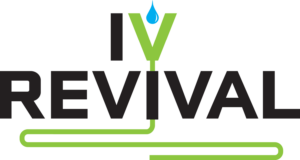Men, are you confused by all of the varying information about what nutrition you need and don’t need? Are you looking for the best diet to promote muscle gain or weight loss? Then you’ve come to the right place. At IV Revival, we want to make being healthy simple. That’s why we’ve compiled this short list of four vitamins for men that are essential to your health.
As always, consult with your doctor before taking any new vitamin supplements.
Vitamin C
Vitamin C is good for a lot of things outside of helping reduce the duration of a cold. For men specifically, vitamin C helps prevent the enlargement of your prostate (benign prostatic hyperplasia, or BPH), which is a common condition for older men that causes urination problems.
It also helps keep your skin, hair, and nails looking young because vitamin C helps produce collagen. Collagen is a connective tissue that holds muscles, bones and other tissues together. Besides helping prevent wrinkles, it also helps prevent bruising, keeps your gums healthy, and speeds up the process of healing cuts and wounds.
The recommended dose of vitamin C for adult men is 90 mg.
If you are deficient in vitamin C, which is very rare in the US with less than 20,000 cases per year, you may experience the following symptoms:
- Muscle pain
- Fatigue
- Fever
- Appetite loss
- Bleeding gums
- Teeth loss
- Rashes
- Frequent bruising
- Coiled Hair
- Irritability
- Weight loss
Where to Get Vitamin C
Good sources of vitamin C in food include green and red peppers, kiwifruit, oranges, grapefruit, strawberries, potatoes, tomatoes, and broccoli.
You can also get it in over-the-counter supplements, and in mobile IV therapies, such as a service offered by IV Revival. Our registered nurses come to your door so you never have to worry about driving to a clinic or waiting in line. Make an appointment online today or call us at 602-755-9525.
Magnesium
Many men, especially African American men, don’t get enough magnesium. Besides supporting healthy muscles, nerves, and bones, magnesium may boost your immune system and prevent heart disease. It also helps sexual traits, as well as enhance exercise recovery and performance.
The recommended dose of magnesium for men is 400–420 mg. Symptoms of magnesium deficiency include convulsions, fatigue, abnormal eye movement, and muscle spasms and cramps. Deficiency is very common in the US: up to 50 percent of the US population is magnesium deficient.
Magnesium Boosts Levels Of Free Testosterone
Free testosterone accounts for less than 4 percent of the total T in the body. It’s responsible for a man’s sexual traits.
In a study published in Biological Trace Element Research, investigators reported that men who took 10 mg/kg of body weight of magnesium supplements per day for four weeks experienced a rise in both free and total testosterone levels.
Magnesium Enhances Exercise Recovery and Performance
Exercise flushes magnesium out of your system, which is part of why your muscles ache SO much after working out. In fact, engaging in vigorous exercise can increase your need for magnesium by 10 to 20 percent. A decline in magnesium levels can impair your exercise performance and slow your recovery time, while increasing your risk of injury.
On top of that, a study in the Journal of Sports Science and Medicine reported that magnesium supplementation had a positive effect on both resting and post-exercise blood pressure.
Where to Get Magnesium
Good sources of magnesium include spinach and other green leafy vegetables, whole grains, beans, nuts, and seeds. You can also get over-the-counter supplements and receive it in our IV treatment at IV Revival.
Zinc
Zinc helps make proteins throughout the body, fights infection, and heals wounds. In men specifically, zinc plays a role in reducing the risk of erectile dysfunction.
Erectile dysfunction (ED) is one of the most common sexual problems for men. It can be caused by a lot of things, from depression to low levels of zinc in your body. This is because zinc enables the male body to produce testosterone.
For an adult male, 11 milligrams of zinc per day is considered the ideal amount to consume.
Symptoms of zinc deficiency include:
- Weight loss
- Slow healing wounds
- Fatigue/lack of alertness
- Diarrhea
- Decreased sense of smell and taste
- Open sores on your skin
- Loss of appetite
You are most at risk for a zinc deficiency if you are older than 50 or live in a developing area of the world. It is rare in the United States.
Where to Get Zinc
Men who are vegetarian often come up short on zinc. Good sources include red meat, seafood (especially oysters), and poultry. Beans and whole grains provide some zinc, but it isn’t absorbed as well as the zinc in meat.
Vitamin A
Finally, we have vitamin A, which is responsible for boosting your immune system, supporting your eye health, and reducing your risk of prostate cancer.
On top of that, vitamin A can also boost your immune system and help the lining of your eyes, respiratory system, and urinary and intestinal tract fight off disease-causing bacteria. It strengthens their lining, which is a huge defense system against colds, flus, and more.
The recommended dietary allowance of Vitamin A for adult males is 900 micrograms per day. Vitamin A deficiency affects about one-third of Americans, though most symptoms are mild. You may experience:
- Dry skin
- Dry Eyes
- More throat and chest infections
- Poor wound healing
- Acne
- Infertility and Trouble Conceiving in severe cases
Where to Get Vitamin A
Good sources of vitamin A include milk, cheese, salmon, broccoli, carrots, green leafy vegetables, squash, cantaloupe, mangoes, and apricots.
